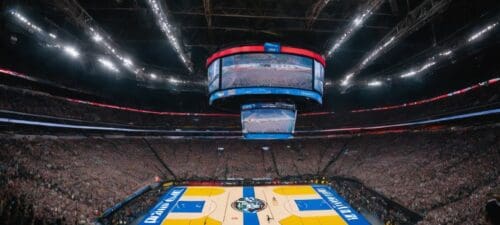Referee Training Standards: Pathways, Requirements & Best Practices
Updated On: October 23, 2025 by Aaron Connolly
Essential Referee Training Standards
Every solid refereeing career kicks off with three core areas that shape how we perform during matches. These standards don’t just build consistency—they help us feel ready for tough moments on the pitch.
Core Competency Requirements
Physical fitness sits at the heart of referee training. We’ve got to hit fitness benchmarks that match what the modern game demands.
The fitness test has us running intervals between markers 150 metres apart. We sprint 75 metres, walk 75, then repeat this over and over for a set time.
- Finish 40 intervals, with time limits based on age group
- Keep a steady pace for the entire test
- Pass both summer and winter fitness checks
Mental resilience training pushes us to make tough decisions under pressure. We run through scenarios where we have to make quick calls and handle player confrontations.
Laws of the Game knowledge means we recertify every year. We study new rules each July, especially changes to VAR and discipline procedures.
Communication skills training covers both how we talk and how we use signals. We practice whistle technique, hand gestures, and ways to calm down heated situations with players or coaches.
Match Officiating Protocols
Before every match, we follow strict routines to keep things consistent. Ninety minutes before kickoff, we show up to check our gear and inspect the pitch.
Essential pre-match tasks:
- Check goal-line tech if it’s there
- Test comms with assistants
- Go through team sheets and pick out key players
- Hold a final Laws of the Game briefing with our team
During the match, we stick to positioning guidelines that let us see the play but stay out of the way. The diagonal system puts us opposite the senior assistant referee.
Match management protocols:
- Apply advantage within 2-3 seconds
- Stick to the same discipline standards all match
- Communicate clearly with VAR when it’s in use
- Calculate and announce injury time properly
After the match, we fill out detailed reports within two hours. These cover all cards, injuries, and major incidents from the game.
Assessment and Evaluation
We get evaluated through several observation methods during the season. Match assessors use set criteria to judge our decisions, positioning, and how we manage players.
Assessment focuses on four main areas:
| Assessment Area | Weight | Key Metrics |
|---|---|---|
| Decision Accuracy | 40% | Correct calls, advantage application |
| Match Control | 30% | Player management, discipline consistency |
| Positioning | 20% | Field coverage, angle selection |
| Communication | 10% | Clarity with players, teamwork with assistants |
Continuous development means we attend training seminars and workshops often. We join video analysis sessions to review our matches with other referees.
Fitness checks don’t stop after the season starts—we do them every few months. Top referees also get extra heart screenings and nutrition advice to stay sharp.
Grade progression comes from consistently high marks over several matches. Moving up from grassroots to elite usually takes 3-5 years at each level.
Peer feedback sessions let us talk through tough situations with other refs. We swap stories and tips for handling tricky moments in future matches.
Certification and Qualification Pathways
Soccer referee certification follows a clear path from grassroots to professional. Most routes start with online coursework, then practical tests, and require regular recertification to stay active.
Initial Certification Processes
Getting certified as a soccer referee starts with an entry-level course. In most places, you can begin at 13 with a basic online program.
Here’s the usual process:
- Finish digital coursework (4-8 hours)
- Pass a written exam
- Send credentials to your local assignor
- Start officiating grassroots matches
Course fees fall between £25-60, depending on where you live. You’ll earn that back quickly, since refs make £15-25 per match.
You’ll need some basic gear:
- Referee shirt, black shorts
- Whistle and red/yellow cards
- Digital watch, notebook
- Good shoes
Most certification bodies give you study materials for the Laws of the Game, match management, and safety. The online setup makes it easy for students and people with busy schedules.
Ongoing Credential Maintenance
To keep your referee certification, you’ll need to recertify every year. This keeps you up to date with rule tweaks and safety info.
Recertification usually means:
- An annual online refresher
- A new Laws of the Game exam
- Minimum match requirements (varies by level)
- Earning continuing education credits
You have to officiate regularly to keep your status. Most groups want 10-20 matches per season at grassroots.
Quick tip: Set up reminders for recert dates. Missing one means you’ll have to redo the whole process.
At higher levels, fitness checks become mandatory. Even grassroots refs benefit from staying fit all season.
Upgrading Levels
After two years at grassroots, you can go for advanced certifications. The typical path is: Grassroots → Regional → National → FIFA.
Higher-level requirements:
- Show you’re competent in assessments
- Meet tougher fitness standards
- Get mentored by experienced officials
- Take part in regular match observations and feedback
Heads up: Each upgrade takes real time and effort. National-level refs often work 3-4 matches per weekend during busy stretches.
The Referee Coach Pathway opens after two years. You can start mentoring while still improving your own skills.
FIFA certification is the top—only for those with years of elite experience. These refs get to work pro leagues and international tournaments.
Upgrading isn’t just about bragging rights. Higher certs mean better assignments, more pay, and chances to ref big matches in your area.
Professional Referee Training Programmes
Professional referee training ramps up with tough fitness sessions, rule drills, and mental training. These programs zero in on elite standards, certification steps, and a strong mentorship network.
Elite-Level Requirements
Pro referees face strict physical and mental tests. They take on fitness drills that mimic the intensity of top matches.
Physical prep means sprint intervals and endurance work. Each week, referees do sessions aimed at making fast decisions even when tired.
Mental training covers handling pressure and making snap judgements.
Key training components:
- Match simulations
- Video analysis
- Communication workshops
- Law interpretation seminars
Consistency matters most at this level. Referees practice for high-stakes moments in realistic settings.
The Elite Referee Program targets those who show real promise for pro officiating.
FIFA and National Federation Standards
FIFA sets the bar for referee development everywhere. National federations follow these standards to keep things consistent.
Professional programs teach all seventeen Laws of the Game, both the basics and the tricky parts, through structured lessons.
Standard requirements:
- Annual fitness tests
- Written law exams
- On-field practical assessments
- Ongoing education credits
In North America, the Professional Referee Organisation manages this. Other regions have their own bodies to keep training unified.
National federations tweak FIFA rules for local needs. They offer structured advancement programmes from grassroots to pro levels.
Mentorship and Coaching
Experienced officials help new referees through structured mentorship. These relationships give practical advice that you just can’t get from a textbook.
Mentors go to matches with developing refs and give real-time feedback. They share stories about handling tough situations and keeping control.
Professional programs pair up promising refs with veterans. That way, knowledge and experience pass down quickly.
Mentorship activities:
- Watching matches and giving feedback
- Career advice sessions
- Technical skill work
- Networking opportunities
Coaching targets specific weak spots found during assessments. Refs get custom training plans to work on what they need most.
Women in Refereeing programs support female officials with targeted mentorship. These groups tackle unique challenges and build supportive networks.
Physical Conditioning and Fitness Standards
Physical fitness underpins professional refereeing at every level. Refs have to pass regular fitness tests and keep up year-round conditioning focused on endurance, agility, and injury prevention.
Fitness Assessment Protocols
Most sports organizations use standard fitness tests to make sure refs meet the minimum. FIFA updated its protocols in 2016, adding interval running and repeated sprint tests.
Professional refs take on two main tests. The interval test checks endurance with progressive running. The repeated sprint test measures how well we maintain speed during quick changes of direction.
Testing usually includes:
- 6 x 40-metre sprints with rest in between
- Interval runs that get faster each stage
- Heart rate checks during sessions
- Mental alertness drills when tired
If we don’t meet these standards, we lose match duties until we improve. So, there’s real pressure to stay in shape all year.
Many groups run these tests twice a year. Some top leagues check fitness every month.
Endurance and Agility Training
We suggest training plans that match the demands of actual matches—not just general fitness. Pro refs need conditioning for the constant stop-start action.
Key training components:
| Training Type | Frequency | Focus Areas |
|---|---|---|
| Interval running | 3x per week | Match-pace endurance |
| Sprint drills | 2x per week | Quick acceleration |
| Direction changes | 2x per week | Lateral movement |
| Recovery runs | 2x per week | Active recovery |
Cardio training is the base. Mixing longer runs with intense intervals helps us mimic match conditions.
Agility is huge for keeping up with play. Cone drills, ladders, and reaction work help us stay in the right spot and avoid collisions.
We also train decision-making under physical stress. Lots of programs add in mental drills during hard workouts to get us ready for real match pressure.
Injury Prevention Strategies
Injury prevention is a must, given how much running and movement we do. Common injuries include muscle strains and joint issues from repetitive motion.
Prevention strategies:
- Dynamic warm-ups before every session and match
- Strength work for core and legs
- Flexibility sessions for hips and hamstrings
- Recovery routines with good sleep and nutrition
A solid warm-up cuts injury risk a lot. We recommend 15-20 minutes of jogging, dynamic stretches, and sport-specific moves.
Strength training helps us handle the physical side of refereeing. We focus on core, legs, and balance.
Recovery is just as important as training. Top refs follow recovery plans with enough sleep, hydration, and smart nutrition around matches.
Heads up: Don’t ignore minor injuries—they can turn serious fast and end your career.
Laws of the Game and Rule Updates
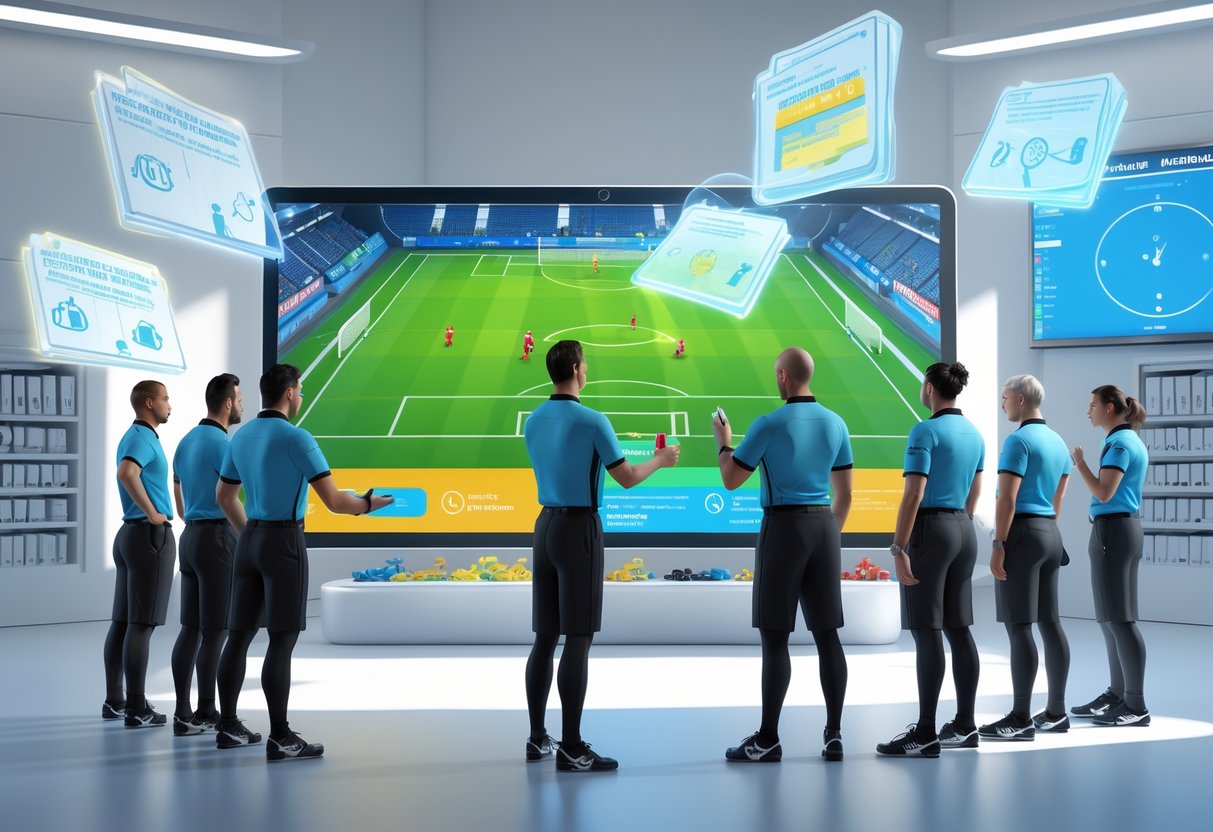
Referees have to master current football laws and adapt quickly to yearly rule changes. IFAB rolls out new interpretations every July, and those updates directly affect our decisions on the pitch.
Comprehensive Rule Understanding
Effective refereeing really begins with a deep understanding of all 17 Laws of the Game. It’s not enough to memorize the rules—you’ve got to know how they actually play out when the whistle blows.
Some areas just trip people up. Offside, for example, gets complicated with factors like “active involvement” and whether an opponent played the ball on purpose. And then there’s VAR, which brings its own set of rules about when tech can step in.
Key areas that need extra focus:
- Handball calls and what counts as an “unnatural position”
- Offside and how “active involvement” works
- Disciplinary actions for dissent and persistent fouling
- Time-wasting rules and how to calculate injury time
We really need to dig into the official IFAB documents, not just summaries floating around online. The exact words matter, especially when you have to decide something in a split second. Regular review sessions help us lock these rules into our heads.
Matches never play out the same way twice. When we truly know the laws, we can keep things consistent—whether we’re working a U10 game or something much bigger.
Ongoing Education on Law Changes
Every year, law updates come in fast and you can’t just ignore them. The 2025/26 changes started on 1 July 2025, bringing new takes on handball, dissent, and how we manage time.
How to stay up-to-date:
- Download the official IFAB documents every July
- Show up for regional training sessions on new rules
- Run through scenarios that use the latest changes
- Watch incidents from recent matches to see rules in action
Last year’s knowledge won’t cut it. Each update tweaks how we see fouls, misconduct, and advantage. The “Only the Captain” rule, for example, really changed how we deal with player behavior.
Refereeing just never stops evolving. Local groups offer update sessions, but honestly, you have to put in the work yourself too. Understanding both the black-and-white rules and the intent behind them is key.
If you want to keep up, you have to keep learning. The laws shift to keep up with tactics and to make sure football stays fair at every level.
Technology and Modern Officiating Tools
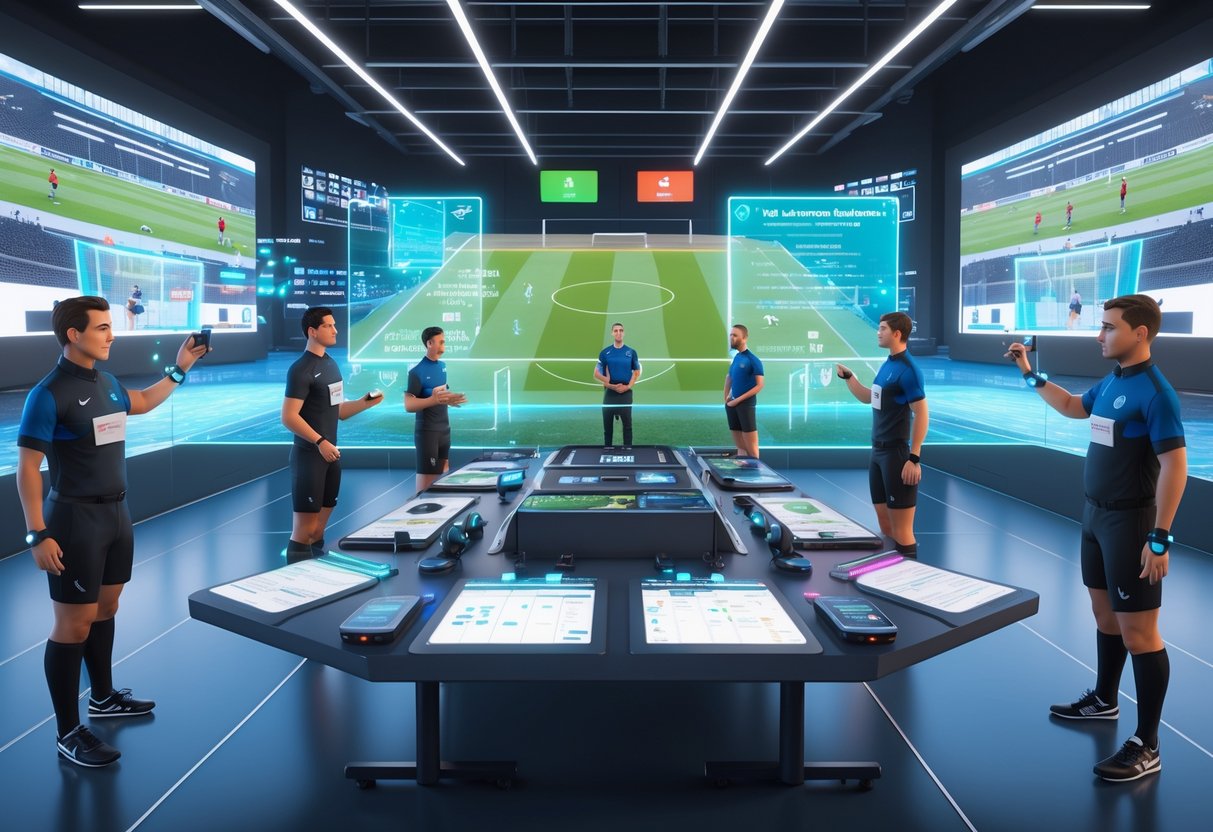
Refereeing these days looks a lot different, thanks to digital tools that help officials make better calls under pressure. Pros now train hard with video systems and communication gear that you just can’t do without anymore.
VAR Training Procedures
When it comes to Video Assistant Referee (VAR) work, professional refs need to get comfortable with some pretty complex tech. They learn to handle multiple camera angles, slow-motion replays, and communication protocols with the rest of the match crew.
VAR operators go through at least 40 hours of classroom training. They cover rule interpretation, how to use the tech, and the right way to make decisions.
During training, referees focus on:
- Making calls in real time using multiple camera feeds
- Communicating between the VAR room and the referee on the field
- Troubleshooting if the tech goes down
- Applying the rules to incidents that can be reviewed
Refs spend hours with simulation software that throws real match scenarios at them. They watch thousands of video clips to spot fouls, handballs, and offside calls.
Assessment isn’t just a formality. Refs have to pass written tests and practicals. They need to spot reviewable incidents in under 30 seconds and explain their decisions clearly.
Use of Communication Devices
Communication systems let referees make calls together, instantly, no matter where they are on the pitch. Pros wear wireless headsets that link everyone—including VAR.
Standard kit includes:
- Two-way radio headsets with noise-canceling mics
- Backup devices in case something breaks
- Encrypted channels to keep things secure
- Battery packs that last at least 120 minutes
Training drills focus on clear and simple communication. Refs learn a set of phrases and terms to cut out confusion, especially when the heat is on.
Officials practice keeping the talk going as they make decisions. They have to report fouls, cards, and incidents fast, without slowing down the match.
Emergency plans cover what to do when the tech fails. Refs train with hand signals and positioning tricks for those moments when the headsets just die.
Psychological Preparation and Mental Toughness
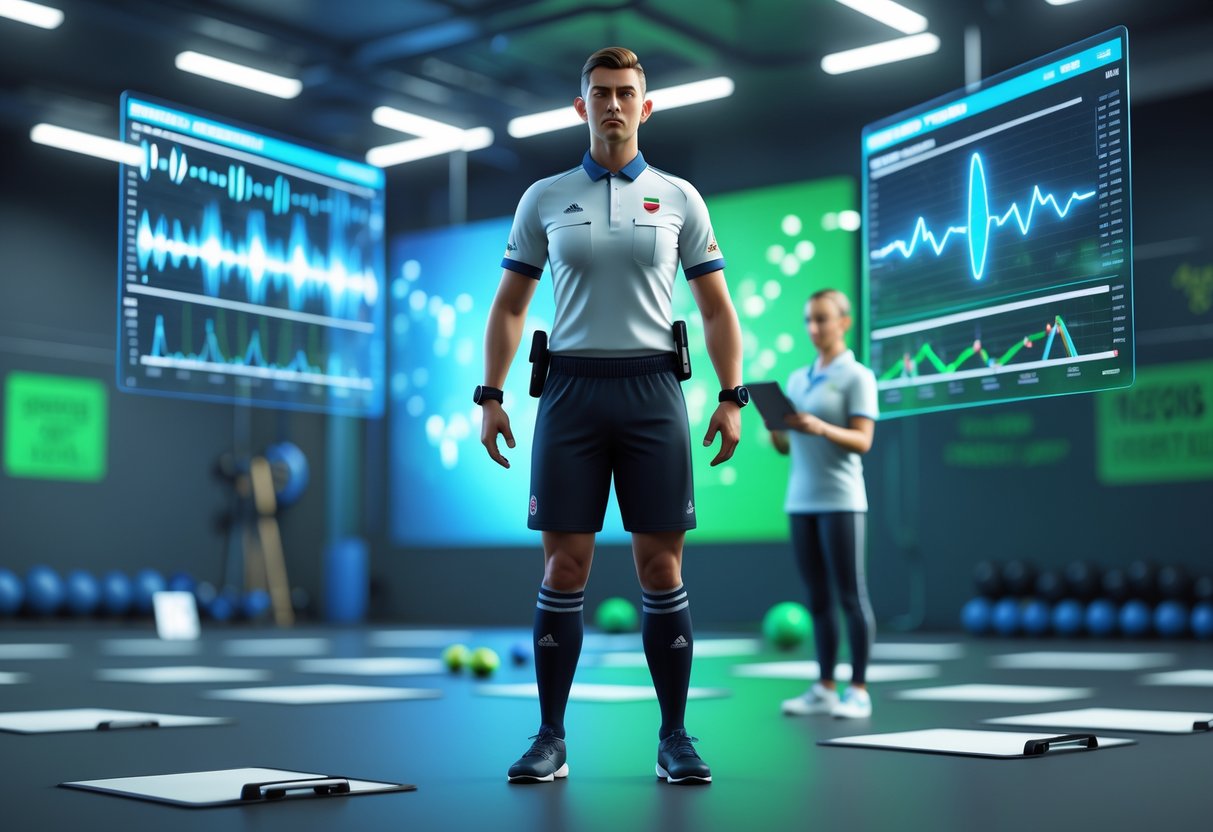
Referees make hundreds of decisions in a single match, all while players, coaches, and crowds turn up the pressure. Mental prep helps us stay sharp, make the right calls, and keep our heads straight from kickoff to the final whistle.
Decision-Making Under Pressure
Elite referees deal with unique challenges. Research says about 64% of referee decisions come after talking with assistants, so clear thinking isn’t optional—it’s essential.
Biggest Decision-Making Stressors:
- Making calls that spark controversy or turn out wrong
- Being out of position when something happens
- Managing mental fatigue, especially late in the game
- Handling instant feedback from fans on their phones
Refs often don’t know how they did until after the match. That delay means you’re left wondering and second-guessing in real time.
Mental Preparation Techniques:
- Visualizing tough scenarios before the match
- Setting goals for positioning and teamwork
- Controlling arousal to keep your focus locked in
- Positive self-talk to bounce back after mistakes
Where you stand matters—a lot. Too close and you can’t see the whole play, too far and you might miss the details. Fatigue in those last 15 minutes? That’s when mistakes creep in, tying your brain and body together more than you’d think.
Stress Management Techniques
Good stress management helps referees keep their cool and make solid calls, even when everything’s going sideways. Mental toughness training zeroes in on resilience, emotional control, and staying present when the heat is on.
Core Skills for Stress Management:
- Breathing exercises to stay calm on the spot
- Attention control to block out distractions
- Confidence routines built through prep
- Recovery habits for bouncing back after rough calls
Refs face aggression from players and coaches all the time. To handle it, they need emotional regulation skills that help them respond like pros, not react out of frustration.
How to Put This Into Practice: We suggest structured mental skills programs with match evaluations, motivational plans, and post-match breakdowns. These tools help referees build strong coping strategies before the pressure hits.
Heads up: Without good stress management, burnout is real—and it’s why a lot of refs quit early.
Mental prep should feel like the real thing. Practice with fake crowd noise, player confrontations, and snap decisions to build resilience for actual matches.
Referee Training for Youth and Grassroots Levels
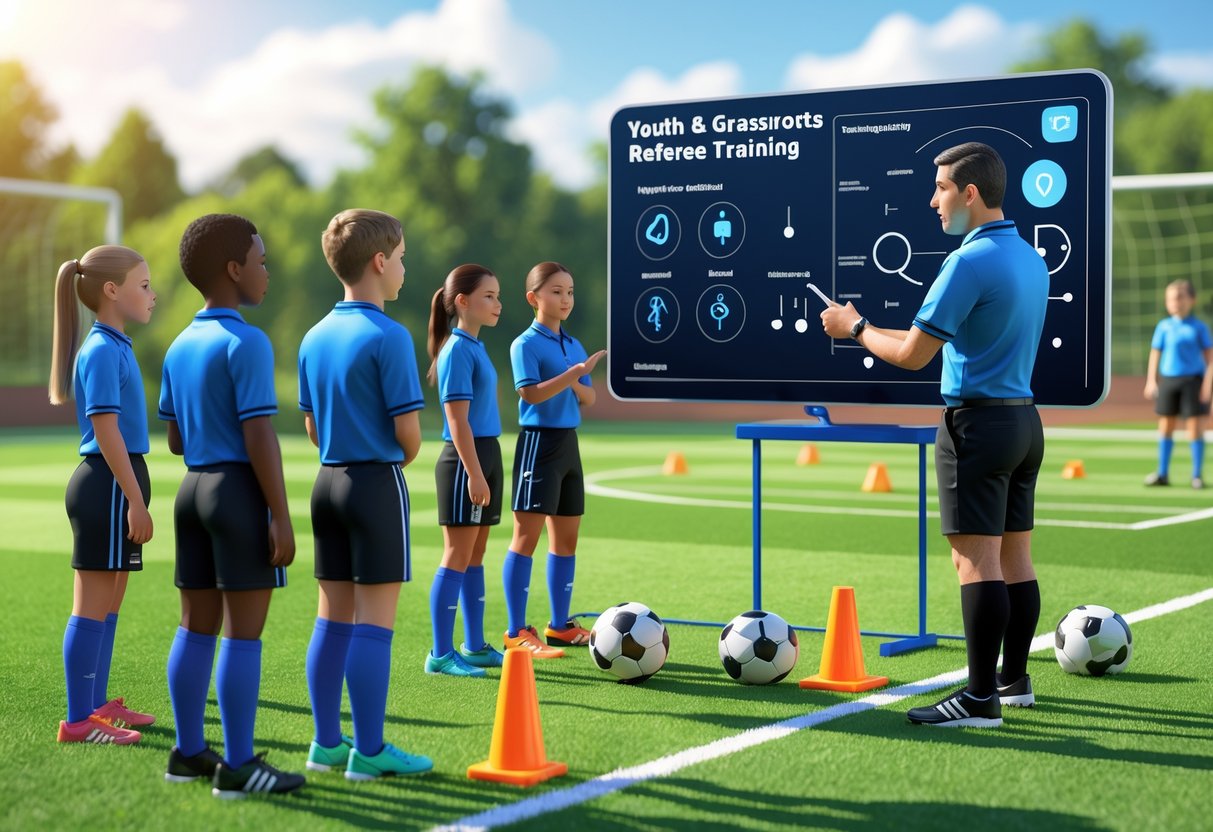
Youth and grassroots referee training lay the groundwork for all officiating. Standard entry-level courses get new refs ready for both recreational and competitive youth matches. After that, support structures help them build confidence and skills through mentorship and ongoing learning.
Entry-Level Courses
The Grassroots Referee Course is where most new officials start. This standardized program preps refs for youth games, both competitive and just-for-fun.
Course Requirements:
- Online lessons from national football associations
- Field training with local referee groups
- Written test you have to pass
- Minimum age is usually 13
The course covers the basics—laws of the game, positioning, mechanics, and communication. New refs practice what they need for youth matches.
Getting Certified:
- Finish the online modules
- Pass the written test
- Show up for a field session
- Send your credentials to your local assignor
Most courses cost between £30 and £50. You can usually earn that back in your first weekend, since youth matches pay £15-25 each.
Training is tailored for youth football. That means learning how to manage younger players, deal with parents on the sidelines, and handle rule tweaks for different age groups.
Developmental Support Structures
Youth referee programs focus a lot on what happens after you get certified. Local associations set up mentorship and extra training to help new refs get better and more confident.
Mentorship Programs:
- Pairing new refs with experienced mentors
- Regular feedback after matches
- Advice on positioning and making tough calls
- Support for tricky situations
A lot of places want new refs to spend two years at the grassroots level before moving up. This gives them the experience they need in a lower-pressure setting.
Training Resources:
- Refresher courses
- Video analysis sessions
- Group discussions
- Online study materials
Development Path:
- Start with youth matches (ages 8-12)
- Move up to competitive youth games (ages 13-16)
- Take on advanced youth tournaments
- Eventually work adult recreational matches
Local referee associations spot promising officials through group assessments. Those who stand out get more chances to develop and work higher-level games.
There’s a real shortage of youth refs in a lot of areas, so new officials get plenty of matches and can move up quickly if they’re committed.
Mentoring and Continuous Professional Development

Structured mentoring programs connect experienced refs with newcomers for one-on-one guidance and skill-building. Pros also join regular workshops and seminars on rule changes, advanced positioning, and managing matches.
Peer Review Sessions
Peer review sessions give referees a chance to learn from each other’s real match experiences. We usually organize these around video analysis of recent games, where refs break down decisions and positioning.
Monthly review meetings bring together 4-6 referees who are at about the same level. Each person brings a clip from a tough match situation they handled.
The group looks at:
- When and how decisions were made
- Body language and positioning
- How players were managed
- What went into pre-match prep
Many associations now use digital platforms to share match clips privately. This lets refs watch incidents several times and talk through different approaches.
Feedback should be constructive, not just pointing out mistakes. Experienced mentors usually run these sessions to keep things helpful and on track.
New refs go to peer reviews monthly for their first couple of seasons. More experienced officials might just check in quarterly to keep their skills sharp.
Advanced Workshops and Seminars
Advanced workshops focus on the technical skills pro refs need for top-level games. We build these sessions around real scenarios and tricky rule interpretations.
Technical seminars dive into things like advantage play, offside during attacking moves, and how to handle VAR communication. These are usually full-day events with both classroom learning and field practice.
Workshop topics might cover:
- Advanced positioning for corners and free kicks
- Handling dissent from coaches and benches
- How to measure and improve fitness
- Getting your mind ready for big matches
International certification often requires refs to put in a set number of workshop hours each year—usually 20-30 hours to keep their badges.
Guest instructors can include former FIFA refs and current pros. They bring real stories from high-level matches and talk about making decisions when the stakes are high.
Practical assessments during workshops help spot where each ref needs more work. This targeted approach keeps pro refs improving, year after year.
Uniform and Equipment Standards
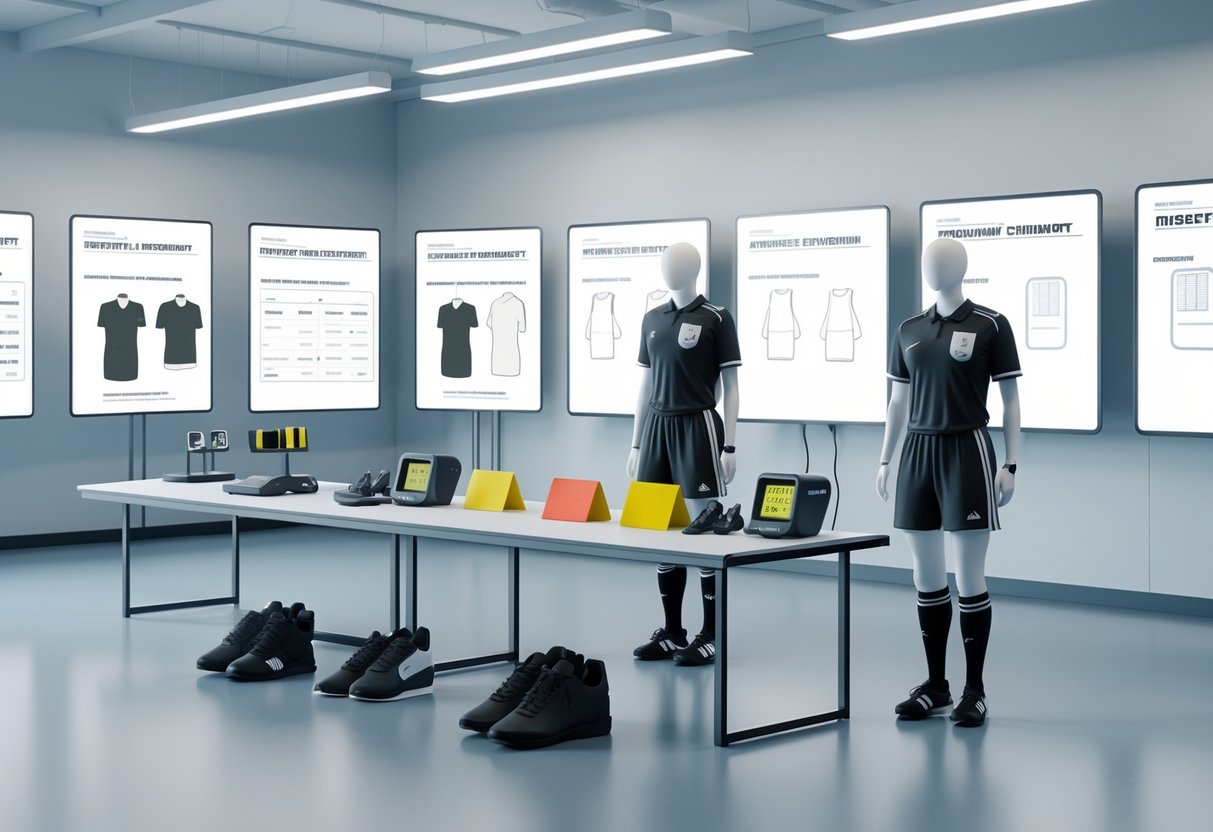
Soccer referee training means following strict rules about uniform and gear. These standards help refs look professional and carry everything they need to run a match smoothly.
Required Attire for Match Officials
The basic referee uniform comes down to five main pieces you need for every match. Your primary kit is a yellow USSF-approved jersey, black referee shorts (not the ones with stripes), and black two-stripe USSF socks.
You’ll also need mostly black shoes and a current year US Soccer referee badge, attached with velcro. Always tuck in your shirt and pull your socks up below the knee—appearance matters.
Alternate jersey colors come into play as you gain experience:
- Black USSF referee jersey
- Red USSF referee jersey
- Blue USSF referee jersey
- Green USSF referee jersey
These extras help avoid clashing with team kits. Most refs find black is the best first alternate, then red if you need a third option.
Your uniform should be clean, tidy, and look sharp every time. Since 2019, the old three-stripe socks and pinstripe jerseys aren’t allowed anymore.
Essential Referee Tools and Gear
Every referee needs certain equipment to properly officiate matches. You’ll want to have a whistle, a watch with a countdown timer, and those classic red and yellow cards for player management.
Required match equipment:
- Game cards and score sheets
- Something to write with (and a backup pen, just in case)
- Referee wallet for cards and paperwork
- Flags for signaling
- Coin for kick-off calls
- Equipment bag to keep things organized
I’d suggest picking up a referee starter kit from an authorised supplier like Official Sports International (OSI). These starter kits usually come with an economy uniform, flags, whistle, cards, coin, velcro disc, and a referee wallet.
Always check your local competition rules for any extra equipment you might need. Youth and rec leagues might be more relaxed, but honestly, you should aim to look professional no matter the match level.
Inclusivity and Diversity Initiatives in Refereeing
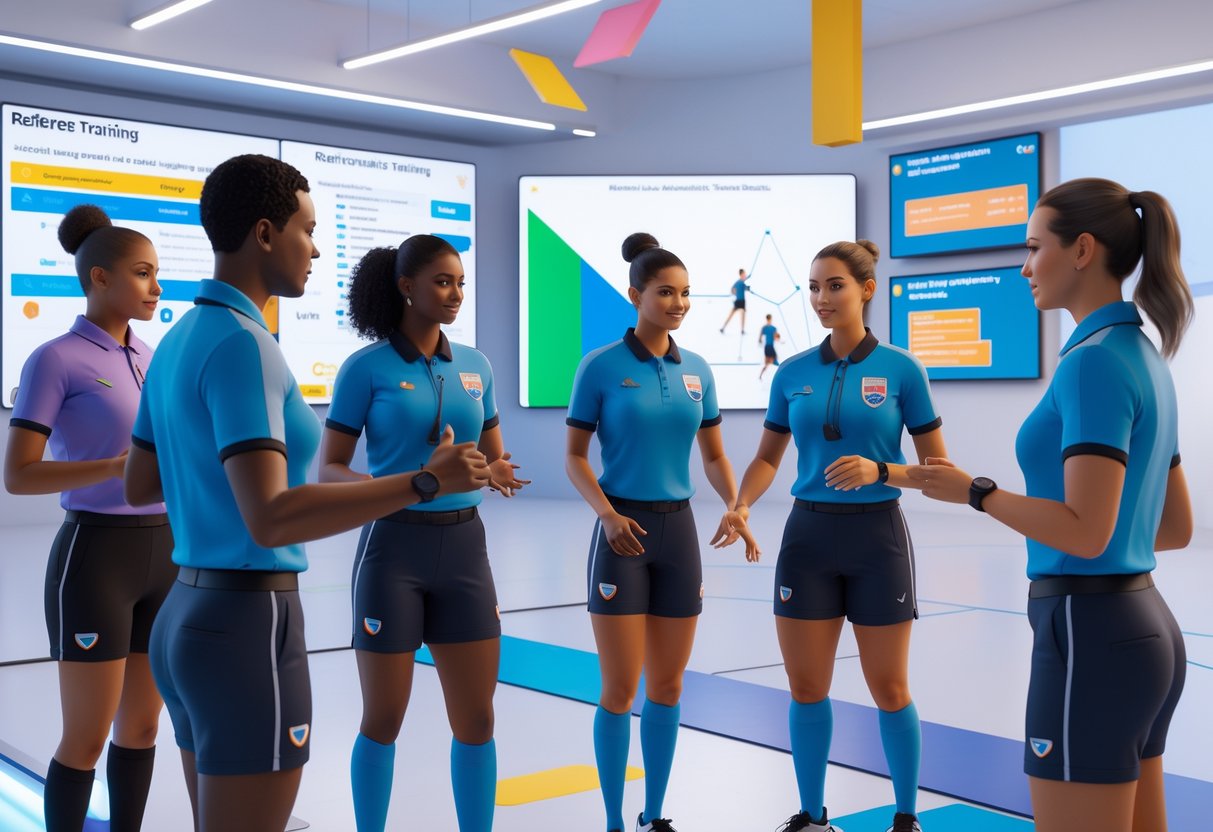
Sports organisations around the world are rolling out programmes to boost representation among officials. These initiatives try to break down old barriers and open doors for women and underrepresented groups to get into refereeing.
Women in Refereeing Programmes
FIFA runs the Women Referees Program, which is one of the biggest efforts to close the gender gap in officiating. The program offers special training, mentorship, and faster tracks to top competitions.
National football associations are getting involved too. England’s FA set up a mentoring programme with over 40 trained referee mentors working across the country. These mentors support officials going through bursary-funded training.
Key Programme Features:
- Women-only training sessions
- Female mentor support
- Accelerated advancement
- Financial help for training fees
- Networking and peer events
Groups like Girls Who Arbitrate focus on challenging gender stereotypes in officiating. They offer resources, training, and mentorship to help develop confident female referees who bring more fairness and inclusivity to the game.
The Badminton World Federation’s “One Sport, One Team” philosophy makes sure educational resources are available to everyone, no matter their gender or background.
Opportunities for Underrepresented Groups
Refereeing initiatives now reach beyond just gender—they’re tackling racial, ethnic, and socioeconomic barriers too. Training programs include diversity, equity, and inclusion modules alongside the usual rules.
The International Boxing Association created an Inclusivity Toolkit as part of their referee development. This toolkit helps officials understand and encourage fairness in all kinds of sporting environments.
Targeted Support Measures:
- Bursaries for training fees
- Translation help for non-native speakers
- Flexible schedules for working folks
- Outreach in underrepresented areas
- Partnerships with local diversity groups
A lot of referee associations now track whether their membership matches the local community’s demographics. This approach helps spot gaps and track progress over time.
Adaptive sports need referees with special training for inclusive officiating. These programs prepare officials to work with athletes who have disabilities while still keeping the game fair and competitive.
Frequently Asked Questions
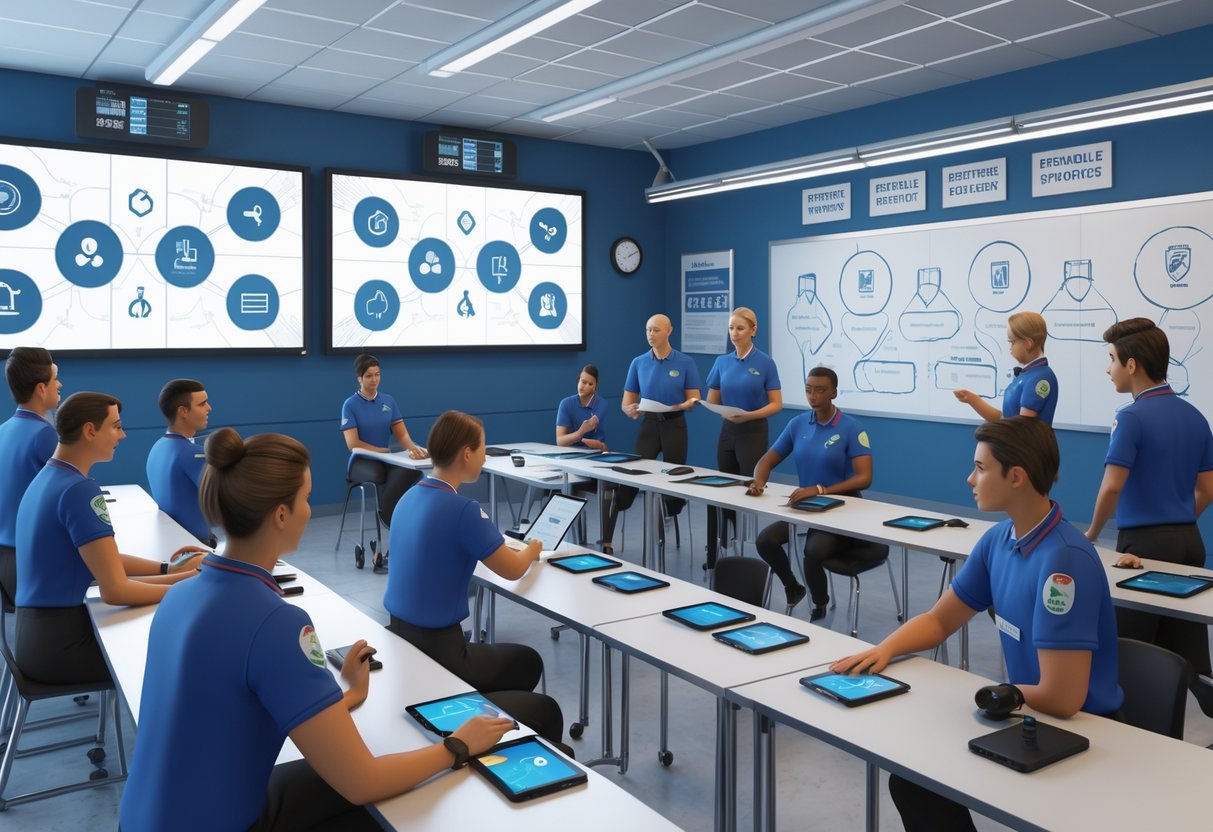
Soccer referee certification comes with its own training requirements, age limits, and renewal steps, and these can vary by organization. Most programs ask you to complete online courses, attend field clinics, and pass a background check before you can start officiating.
What are the steps to become a certified soccer referee in the United States?
You’ll start by finishing some basic volunteer requirements. That means completing online courses like AYSO Safe Haven, Concussion Awareness, Sudden Cardiac Arrest, and SafeSport.
These courses take about 2-4 hours altogether. You can usually find them on the organization’s website once you make an account.
For 8U matches, you just need the 8U Official training—a single class that lasts about 2.5 to 3 hours.
If you want to move up, you’ll need Regional Referee certification. That involves online training (3-4 hours) and an in-person field clinic (3-4 hours).
Most organizations also run a background check through services like Sterling. Youth referees usually skip this part.
How does one renew their soccer referee certification with U.S. Soccer?
Every referee needs to recertify each year to keep officiating. The process depends on your certification level and how long you’ve been inactive.
You’ll need to keep your Background and SafeSport training up to date, since those expire separately from your main license.
U.S. Soccer sends out email reminders when your certifications are about to run out. If you miss something, you could land on the suspended list.
Grade 8 Referees who miss two or more years have to retake the Entry Level Referee Training Course. Higher-grade referees drop down one level after being inactive for a while.
Where can I find a local soccer referee certification course near me?
Most of the time, local youth soccer groups like AYSO regions run referee training. Check your area’s AYSO website for training calendars and course dates.
Regional organizations usually offer two in-person clinics per season. If the dates don’t work for you, you can often attend clinics in nearby cities.
You can complete the online portion at your own pace before heading to the field session. Many regions bundle the online and in-person parts together.
Reach out to your local region’s Officials Chair for details about available courses. They’ll help you find the right training based on the age groups you want to referee.
What qualifications are required to officiate youth soccer matches?
The qualifications depend on the age division you want to referee. Every referee needs the basic volunteer certifications, no matter the level.
For 8U matches, you’ll need 8U Official certification plus the standard volunteer training. The focus is on simpler scenarios, since younger players move slower and use basic tactics.
For 10U and up, you need Regional Referee certification. That means learning the full Laws of the Game, including offside rules that don’t show up in 8U.
You’ll also need to know how the three-person referee system works in older divisions. That’s one center referee and two assistants working together.
Can I obtain a basketball referee certification at the U.S. Soccer Learning Centre?
No, U.S. Soccer only handles soccer referee training. Basketball referee certification comes from totally different organizations.
Each sport has its own governing body and certification requirements. Soccer training won’t qualify you to officiate other sports.
If you want to referee more than one sport, you’ll need separate certifications for each. The training and rules aren’t the same.
If soccer’s your main interest, focus on that certification first. You can always branch out to other sports later through their own organizations.
What are the age requirements for enrolling in a referee training course?
Age requirements really depend on the division you’re aiming to officiate and your certification level. Most programs actually welcome and encourage youth referees.
If you want to get 8U Official certification, you need to be at least 10 years old. That’s usually the starting point for young referees.
To earn a Regional Referee certification, you have to be 12 or older. This one lets you officiate 10U matches and above.
Higher certifications ask for more. You’ll need to be 14 for Intermediate Referee. Advanced Referee bumps that up to 16, and National Referee requires you to be at least 18.
Young referees get a chance to learn responsibility and really get to know the game. A lot of them stick with officiating all through secondary school, sometimes even longer.








